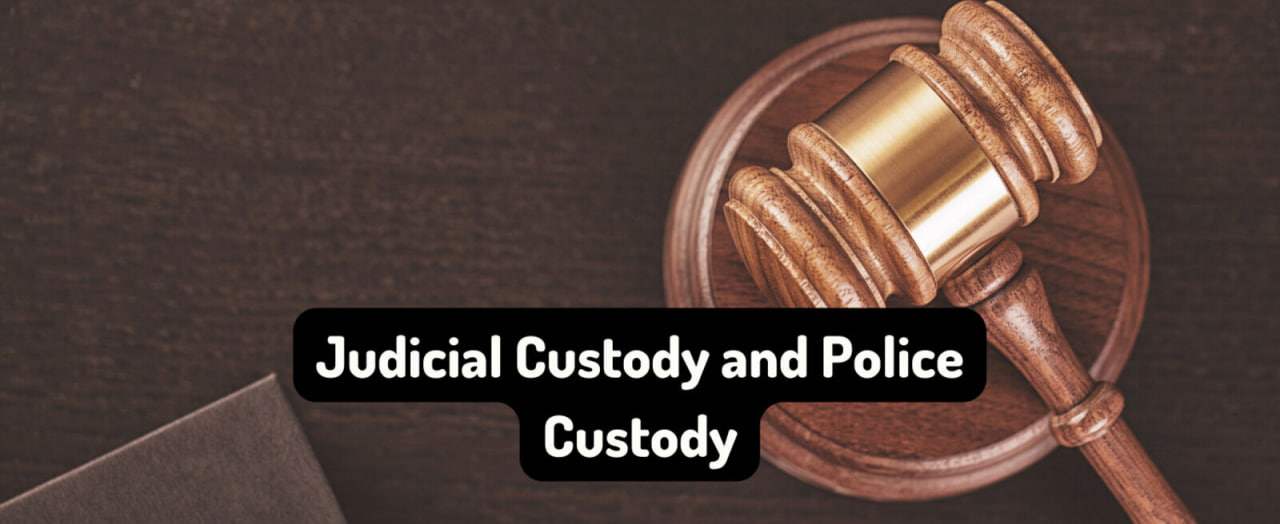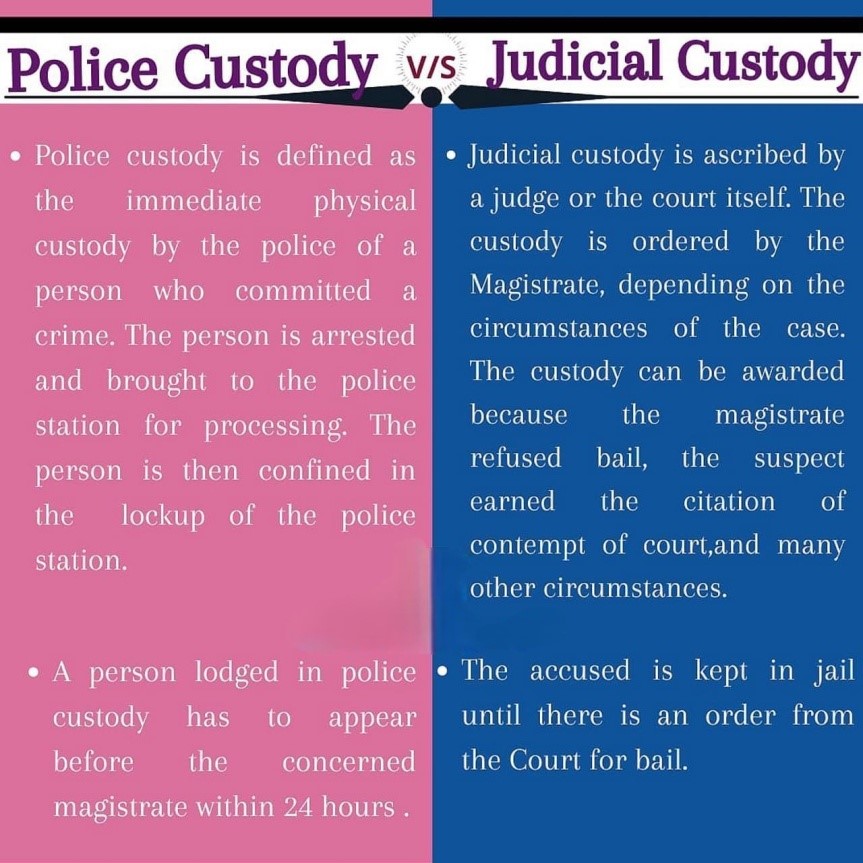Description

Copyright infringement not intended
Context: The Supreme Court stated that it had to review a 1992 judgment that stated that no detention in police custody beyond the first 15 days of arrest is acceptable.
Details
Background
- The Central Bureau of Investigation (CBI) had petitioned the Supreme Court for additional custody of an accused who is facing charges under the Prevention of Corruption Act, as well as breach of trust and conspiracy.
- Earlier, he was hospitalised after two and a half days in detention and was later given bail.
- The CBI claims that despite police custody remand, he could not be interrogated by the CBI and hence warrants further custody.
- The lawyers challenged the new demand for police custody, citing a 30-year-old court precedent that stated that police custody beyond 15 days from the date of arrest is not lawful.
- In the case of Central Bureau of Intelligence vs. Anupam J. Kulkarni (1992), the Supreme Court ruled that an accused cannot be retained in police custody after 15 days from the date of arrest.

Police Custody
About
- Police custody refers to the situation in which a person is detained and held in police custody for interrogation, investigation, or the prevention of further criminal activities.
The present time limit for Police Custody
- A magistrate can only order police custody for a maximum of 15 days. Following that, the accused must be either freed on bond or placed in judicial custody, where he or she is detained in jail under the supervision of the court.
- Police custody may be extended beyond 15 days only if the accused has committed a heinous crime punishable by death, life imprisonment, or imprisonment for more than ten years. The police can seek judicial custody for up to 90 days in such circumstances.
Rights of an accused person
- Police custody does not indicate that the accused individual can be tortured, abused, or harassed.
- The accused has the right to be treated with dignity and respect, as well as to be informed of the reasons for his or her detention and the charges levelled against him or her.
- Police custody also does not imply that the police can question the accused without his or her consent.
- The accused has the right to remain silent and refuse to answer any questions that may incriminate him or her.
- The accused individual has the right to consult with a lawyer of his or her choice and to get legal aid if he or she cannot afford a lawyer.
Role of Magistrate
- The Magistrate has the authority under Section 167 (2) of the CrPC to "authorize the detention of the accused in such custody as such Magistrate thinks fit, for a term not exceeding fifteen days in total."
- Police custody is subject to judicial review and monitoring. Within 24 hours of arrest, the police must bring the accused person before a magistrate and report on the progress of the investigation.
- If there are any signs of harm or ill-treatment, the magistrate may require a medical examination of the accused person.
- If the magistrate is dissatisfied with the police custody, he or she may grant bail or transfer the offender to judicial custody.

Concerns
- Length of the Custody: The period and conditions of police detention. In some circumstances, police detention could last many days or even weeks without judicial oversight or review. This can result in extended deprivation of liberty, as well as an increase in the likelihood of torture, ill-treatment, or coercion.
- Use of Force of Violence: The use of force and violence in police custody. There have been numerous examples and reports of police personnel using excessive or unjustified force and violence against inmates in custody. Physical assaults, beatings, electric shocks, sexual abuse, or psychological pressure are all examples of this.
- Lack of Accountability: The absence of accountability and transparency in police custody. There is frequently no efficient process or procedure in place to monitor, investigate, or discipline any wrongdoing or abuse that happens in police custody.
Suggestions to reform the Police Custody system
Limiting and regulating the duration and conditions of police custody
- Police custody should be used only as a last resort and for the shortest possible time necessary.
- It should also be subject to regular judicial oversight and review.
- The conditions of police custody should comply with international standards and norms, such as providing adequate food, water, medical care, hygiene facilities, and legal assistance to the detainees.
- The detainees should also be informed of their rights and obligations in a language they understand.

Prohibiting and preventing the use of force and violence in police custody
- Police officers should respect and protect the human rights and dignity of the detainees in their custody.
- They should use force only when strictly necessary and proportionate to the situation.
- They should also refrain from any act or threat that may cause physical or mental harm or suffering to the detainees.
- Any allegation or suspicion of torture, ill-treatment, or coercion in police custody should be promptly reported, investigated, and prosecuted.
Enhancing Accountability and Transparency in police custody
- There should be an independent and effective mechanism or body to monitor, inspect, and evaluate the conduct and performance of police officers in relation to police custody.
- There should also be a comprehensive and accurate record-keeping or documentation system for all aspects of police custody.
- This should include information such as the identity of the detainee, the reason for detention, the time and place of detention, the treatment received by the detainee, any complaints made by or on behalf of the detainee etc.
Way Forward
- Police custody is an essential step in the criminal justice system because it concerns both individual rights and freedoms and the interests of public safety and security.
- It is a necessarily limited strategy used by the police to maintain law and order and to preserve public safety.
- There are several challenges and concerns, including the possibility of abuse, coercion, mistreatment, or violations of human rights. Therefore, reforming the police custody system is critical to ensuring that it is fair, transparent, and accountable, and upholds the rule of law.
Must Read Articles:
Custodial Deaths: https://www.iasgyan.in/daily-current-affairs/custodial-death-27
Preventive Detention: https://www.iasgyan.in/daily-current-affairs/preventive-detention-21
Guidelines on Bail and Arrest: https://www.iasgyan.in/daily-current-affairs/guidelines-on-bail-and-arrest
|
PRACTICE QUESTION
Q. Police forces are the organ of the state to regulate the behaviour and activities of individuals and groups for the public welfare. It is a necessary and legitimate function of any government, but it can also pose a threat to the rights and freedoms of the citizens if it is abused or misused. Discuss the need of exercising control over police authority in a democratic democracy.
|


https://indianexpress.com/article/explained/explained-law/sc-to-review-1992-judgement-barring-police-custody-beyond-15-days-what-does-the-current-law-say-8551980/












